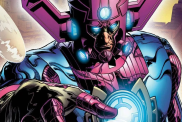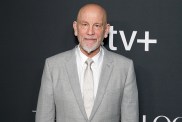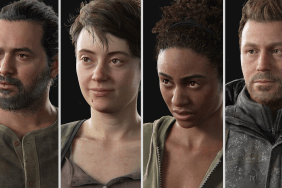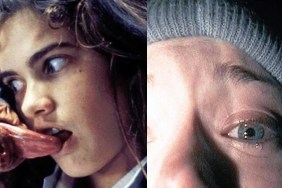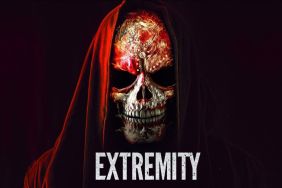Opening in theaters January 29th

Cast:
Jackson Rathbone as Stephen
Shaun Evans as Quaid
Hanne Steen as Cheryl
Laura Donnelly as Abby
Jonathan Readwin as Joshua
Directed by: Anthony DiBlasi
Review:
“Fear is pain arising from the anticipation of evil,” Aristotle declared. With his uncompromising expansion of the Clive Barker Book of Blood short story, director Anthony DiBlasi offers a brutal psychological analysis of one man’s campaign to comprehend and erase his innermost fear so he can eliminate the dread he lives with daily.
Dread, which screened during Fantastic Fest and opens January 29 as part of After Darkâs Horrorfest 4, isn’t your typical Barker cautionary tale committed to film. It may open with a young boy witnessing an axe-wielding madman chopping up his parents, but it’s not about confronting a monster of human or inhuman origin. Instead, it’s about how our fears – real or imagined – not just can define us but leave us in an emotionally destructive state of anxiety.
Quaid (Shaun Evans) has serious issues, which can only be expected for someone who many years ago watched his parents die horrible deaths. Adding to Quaid’s mounting problems: the killer remains uncaught. No wonder Quaid needs enough pills to mediate the mental ward of the nearest hospital. Without them, he has horrifying visions of the killer coming after him.
Film student Stephen (Twilight‘s Jackson Rathbone) leads a quiet life that likely stems from his older brother’s untimely death. Then his world is turned upside down when he strikes up an unexpected acquaintance with Quaid. It’s Quaid’s idea for Stephen to do his thesis on people’s fear. Stephen needs an editor, so he ropes in Cheryl (Hanne Steen). Neither of them are aware of the extent the somewhat unsettled Quaid will go to make the documentary not just a study in fear but an experiment designed to vanquish his personal demons.
Disappointed with the interview subjectsâ routine revelations, Quaid decides to take things to the next level. This is when matters naturally turn deadly for those involved in making and contributing to the documentary.
DiBlasi’s thoughtful approach to Dread ensures the horror of the situation is played out in disturbingly honest fashion. The more Quaid works toward his objective, the greater the discomfort we feel at the everyday fears we harbor and DiBalsi keenly exploits. This is never more evident than when one unwilling participant is faced with the gut-wrenching decision to eat a week-old rancid piece of meat in order to prove Quaid right or wrong. This particular moment is likely to cause you throw up a little in your mouth (or probably worse for those among the Fantastic Fest audience members at Austin’s famed Alamo Drafthouse Cinema who had just finished feasting on a steak sandwich). That someone would willingly eat the seemingly uneatable induces a greater visceral reaction than watching a zombie tear someone to shredsâit’s more shocking because it’s rooted in reality.
Revealing Stephen and Cheryl’s deepest fears would give too much away about the way DiBlasi – who also served as an executive producer on Barker’s ho-hum haunted house tale Book of Blood – chooses to close Dread (it understandably deviates from Barker’s original ending). Their fears are manifested in grotesque and unimaginable ways, resulting in dire consequences for all. But there is nothing salacious about Dread in the way these fears are presented and addressed. In less assured hands, one subject dealing with body image and self-esteem issues would be treated as nothing more than a freak of nature. DiBlasi, though, creates great empathy for this woman, who’s tormented by having to explain away her affliction to every stranger she meets.
As Dread is based on a story by Barker, you know DiBlasi doesn’t intend to offer us a cathartic experience, at least not in a conventional sense. Still, for all the mind games and physical humiliations on offer in the final act, Dread never comes close to setting foot on torture-porn territory. This isn’t Saw or Hostel, where we’re supposed to derive enjoyment in the evil that men do. DiBlasi succeeds at his goal of making us feel for with the victims and to root for them to find a way to safety. That’s not to say the ending is entirely satisfactory. It does hinge on a contrived plot twist that finds one victim taking the unlikeliest of actions.
At the heart of Dread is the complex relationship between Quaid and Stephen. It’s easy to understand why Stephen – a shy and compassionate young man resigned to living an uneventful existence – would be drawn to a man who knows no boundaries. Stephen knows Quaid isn’t all there, but that’s part of his appeal. Yet Stephen is smart enough to realize that it’s time to distance himself from Quaid when things start to get out of control. You are always aware that this is a friendship that is doomed from the start, but Rathbone and Evans never force the way it evolves.
Rathbone imbues Stephen with great sensitivity, but he’s thankfully not too touchy-feely. He not only gives Dread its moral compass but provides an essential balance to Evans’ heightened freneticism. The initial problem with Evans is that he tips you off too early that Quaid’s a man willing to go to the extreme to get the results he wants. That said, Evans ultimately offers an intriguing portrait of a man whose attempt to address his emotional and psychological problems push him to the edge of insanity. The best performance, though, comes from Laura Donnelly as a woman with a deep purple birthmark that covers one entire side of her body. Donnelly refuses to make her Amy a figure of pity; instead, she chooses to instead to reveal Amy’s fears and insecurities in a subtle manner that moves us to understand and appreciate all she’s endured.
If you didn’t know Barker wrote the literary version of Dread, you probably would think the film owed more to the dark and painful studies of the human condition by Fight Club‘s David Fincher. Regardless, DiBlasi’s given us the most satisfying adaptation of a Barker story since the author dropped his pen and stepped behind the cameras for Hellraiser. It leaves you with great hope that DiBlasi’s the right man to tackle the next film based on a Book of Blood tale, the supernatural chiller Pig Blood Blues.
“If you don’t go out and find the beast, sooner or later the beast will come looking for you,” Quaid declares. With Dread, DiBlasi unleashes a beast that requires us to look within and question whether there really is nothing else to fear but fear itself.





